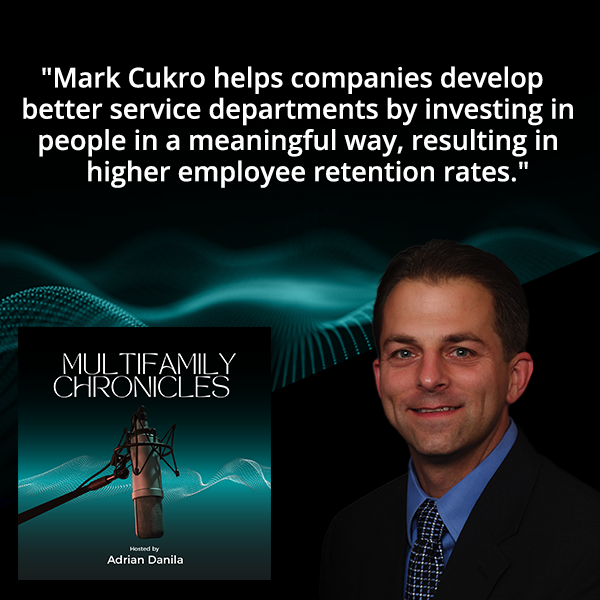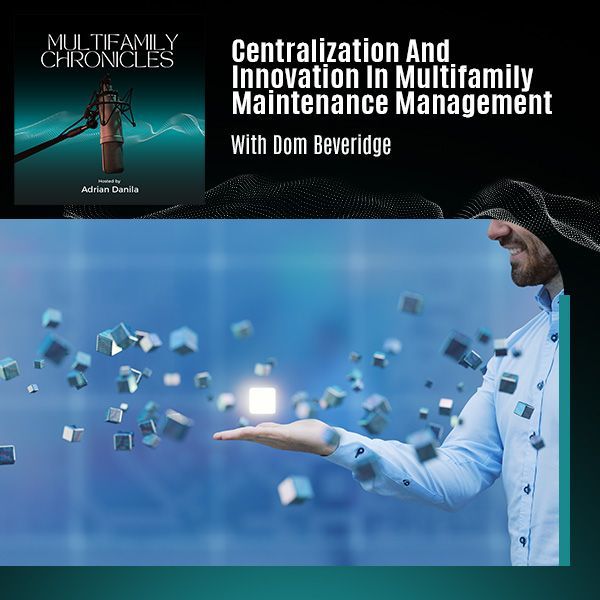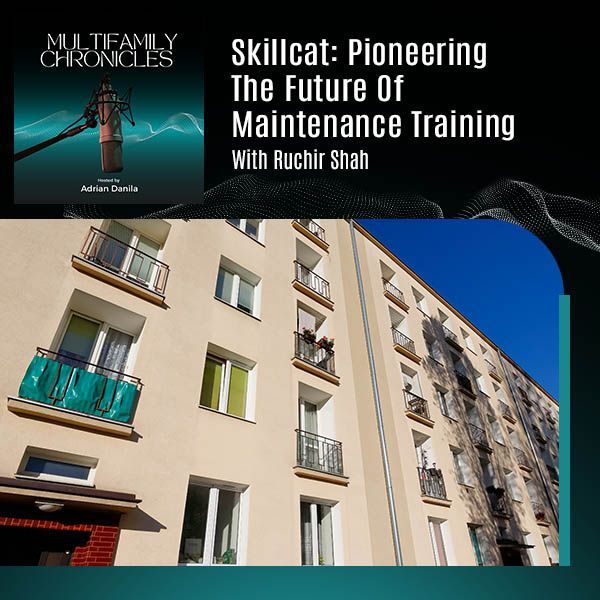Creating Better Company Cultures with Mark Cukro
To hear people say, “be grateful that you have a job,” can be annoying, especially when your workplace is not healthy for your well-being. In this episode, Mark Cukro, the President of Plus One Inc., shares his insights on how to drive employees in the workplace to keep them productive in your business. Mark also speaks from his experience on how technicians should be treated, no matter their position, because there is no hierarchy on how people should be treated. Do the best you can to improve the day-to-day experience of your employees in your business to gravitate toward success. Tune in now.
---
Watch the episode here
Listen to the podcast here
Creating Better Company Cultures with Mark Cukro
My guest is a very special guest. Mark Cukro is a professional in the multifamily industry that I've been following for many years. We have intersected a few times, not in person but we know each other. I'm honored to have Mark on a show. Mark, welcome to the show.
Thanks for having me. I appreciate it.
Let's start by telling us a little bit about yourself and your background.
Before I entered multifamily, I was an HVAC contractor. I've done trades my entire life. When I moved to Charlotte, North Carolina, I started in multifamily as a groundskeeper. I occupied every position there is in the service department, technician 1, 2, 3, supervisor, and regional director. Eventually, I took on a national role for Cornerstone and Colonial Properties. I was the director of the development of their service teams. What that meant was developing training programs, measuring the results in the field, and changing the programs.
Over the years, outside of the industry, I was a public speaker. This is my 18th year on my own as a speaker and a consultant. My focus is specifically on developing the service departments, the training, the processes, and the experience of all of that. I can give every technical certification there is. I've helped rewrite how many versions of CAMT now. I have CAPS, CAMT-I and CAMT-II. I'm a proctor for all of the HVAC excellence courses, and the swimming pool. I'm also an NAAEI instructor. It certainly doesn't mean that I know everything. I'm still learning like everybody else. I don't even like to be in the company of people that act like they know everything. It's a little too arrogant. We all have our areas of expertise, and then we're novices in the things that we're not experts in.

In addition to that, I'm a professional jujitsu coach. I've had my own academy. This is my 18th year. Not only did I start one business, I started two at the same time. I'm also on the board for one of the largest associations. That's my personal experience. In my personal life, I've been very fortunate and blessed to be married to my wife for 22 years. We've been together for over 25 years. We have wonderful teenagers. They're twins. That's it.
I do my best in the industry and help people and companies develop service departments, but more importantly, the culture that is required to keep people, and then how we invest in them in a meaningful way in the field. It's not enough to say, "You should be grateful you have a job." How are we building people up? How are we getting that done in a way that they want to stay?
You're making so many great points. We have to provide meaning for our associates. It's not enough to say, "Be grateful that you have a job." In all honesty, there are so many opportunities out there for individuals, especially for highly qualified individuals who I consider to be experienced maintenance technicians.
If I look in my market here in Atlanta where I'm based, I could type on my phone, "Maintenance technician in Atlanta," and I'm going to have 30 to 50 openings immediately. A single individual that has their resume preloaded on their Indeed profile could apply to 50 jobs in five minutes because it's just one click to apply, and then the competition starts. The opportunities are plenty. It's just who is going to have the best opportunities in order to win the best talent.
It's interesting because years ago, your thanks and gratitude were a paycheck. Now, things have changed. The industry has become so much more professional and demanding. With those demands, comes much higher expectations, what typically happens is the bigger a company is, the slower it is to react. They typically like to express and communicate how big and successful they are, but it's rare that you hear a big company brag, boast, or promote the fact that they're nimble and that they can move and adjust in a way that's meaningful to a small local market.
Everything is changing. There are so many trades jobs open. What's interesting is there are some companies that don't have any openings. They're full and the people don't leave. We have companies like that right now as we speak. It's a rarity, but they're out there. My question would be, "Why do some companies refuse to look at the data and act in a way that's more measurable, instead of trying to conform the workforce to its own perspective?"
I'm not saying that you create this utopia for a workplace. We have to treat people in a humane meaningful way that gives them some level of fulfillment and builds a sense of gratitude. Otherwise, they're going to leave and go somewhere else that can provide that. Even if the money is close, they're going to leave for a better environment. If anything comes out of these past few years, it is a completely new shift in the way associates are treated and what we expect will surface because of this.
You're making a couple of great points that I want to touch on. One of them would be the size of the company versus thinking, "We're large, therefore we're great." I always make this comparison. I compare a large organization with a large ship. How easy is it to change course for a very small fishing vessel that's designed for 2 or 3 fishermen versus a commercial fishing boat that's very large that accommodates hundreds of thousands of people on a boat? You're right. The larger the ship, the harder it is to change direction. The willpower is not so much present there to make changes or adapt very fast to new environments.
As you and I both learned and everybody that's tuned into this, this is a very fast-changing environment. You have to act immediately to the market changes. If you do not, you're going to be left behind. Talent doesn't wait around. Talented individuals are knocking on many doors at the same time. If you are fortunate enough to have someone show up for an interview and discuss the opportunity with you, that person at the same time is juggling 2, 3, or 5 other interviews. You are not the only show in town.
With that in mind, what are you going to do about it? What type of offer are you putting on the table? How fast are you going to act on that lead and have that offer ready for your candidate? Also, how do you present yourself in an interview? You are representing the company. You're the face of the company. The way that person receives you as an individual is the way they see the company, especially if they don't know much about your company. What are you going to do in order to attract that individual?
In the interview, for the person that is a prospect, the impression they get from the person on the other side of the desk is the brand. You can look at it in a few simple ways. How can you communicate to someone in such a way that they can't wait to work for you? If you were on the other side of the desk looking at yourself, would you be impressed? Would you think they're a manager or a micromanager? Are you encouraging? Are you coercive? Are you too busy with everything going on that you're in a rush through the interview? You have to have a sense of urgency and poise at the same time. If your urgency communicates desperation, it's not a good message for the person that's on the other side looking to find a company to work for.

From personal experience, the one thing that is across the board that we need to improve is the way that technicians are treated and spoken to. Very often, it’s the perception of the people. The managers in the office or corporate office are under the impression that their communication is appropriate and that it's professional, but in the field from the opposite direction, it is not perceived that way at all. There are stylistic differences in communication.
You may have a lot on your plate and you get to the point and a technician is like, "You can't talk to me like that," and then someone else is like, "We need it done." They're like, "I understand but you can't speak to me that way." We have to make sure that there's no hierarchy in the way people are treated. You're either treated like a fair decent contributing human being or you're not. Instead of looking at the hierarchy, could you ask yourself, "We both contribute. How can we get the best out of each other? Can we both do our best instead of giving what's left of us?" It's simple but it's not an easy thing to do too, but it makes a difference.
Make sure that there's no hierarchy in the way we treat people. You're either treated like a fair, decent, contributing human being or not.
You're absolutely right. I had situations where community managers address teams or service professionals in a certain way. As you said, they thought they were professional. I honestly did not think that they weren't professional. It was how their message was perceived. I went back and I stressed to them. I said, "In essence, you're right. All these things had to be accomplished, but I want you to please consider them. The problem is not what you said. It's how you said it or how you came across to that individual. I want you to please reconsider because it didn't go well."
I actually had those conversations with a couple of community managers because I try to help. At the end of the day, there are situations that could be avoided. Once the situation is created, we have to try to go back and repair it. If we're ideological about our truths and we say, "I did everything right," and the other person doesn't think that we did everything right, how are we going to bridge or close the gap? There’s no way. We have to understand and have this self-awareness, "I might have come across this wrong. I have to apologize and try to start over again. Maybe there's a second chance for us." It's very easy for a relationship to go sideways.
You were saying that the way you approach selling an opportunity to an individual is like sales. You didn't use the words but in essence, it's exactly what you said. The way you present it is if it looks appealing, that person may sign up for your company. I've been stressing this for a while and saying that hiring managers or people that are doing the interviews have to be in a sales mindset. They have to think like salespeople. When you're recruiting or trying to find a person to fill a job opportunity, you are selling that opportunity to the public. There are things you have to consider.
For example, where are your candidates living? If you going to advertise for groundskeepers and techs, you do not want to put your canvas on LinkedIn because there's nearly no one qualified or interested in that type of opportunity. Service managers are coming to LinkedIn and becoming members of the platform and other regional types of levels. For something that's groundskeeper or technician, LinkedIn is not the place to advertise.
There are Facebook groups that are maintenance-related where maintenance people are hanging out. I'm part of some of those maintenance groups. That's where I spend quite a bit of time reading posts and comments so I could better understand exactly the things that matter to them so we can be prepared. When we make offers and talk to candidates, we understand what's important to them. What's your experience with this?
From my perspective, especially in the corporate world, we talk a lot about demographics, analytics, multiple platforms, and generational uses and preferences of Instagram, TikTok, LinkedIn, and Facebook. We don't apply that to looking for technicians. It's interesting to see, but we have to understand where people are or where they congregate socially and technically, and then appeal to them there. When you do an interview, the most important thing you can do is be completely present. If you look at your phone during an interview, the interview is over. You've already communicated to the person that the notification is more important than your attention. The thing about interviews is you have to be professional but you can be personable.
Establish a human connection. That doesn't mean being superficial. You have to be congruent, authentic, and sincere. If your culture doesn't match that person, then stop right there and then help them find a job somewhere else because they'll probably refer someone to you down the road. When you're known as a place that can match people with companies and positions, you're going to be a very common resource.
Back to the communication piece though, you and I see this all the time, but please don't ask your technicians, "Did you do anything today? What did you get done?" I see this a lot when people walk into the office and they’re like, "Did you get anything done today? What did you do?" Please stop. If I came into the manager's office and said, "What did you do today? Did you get anything done? I'm just joking." It doesn't come across that way. That's probably one of the most consistent comments I get from having in-the-field conversations with people.
The thing is you have to be you. You can have fun at work and have a sense of humor, but not everyone appreciates your sense of humor and you have to be okay with that. No matter how good your company is, someone is going to complain about it. That's how it is, but at least you're doing the best you can, whether that's with the presentation of yourself or the environment that people are in. The day-to-day experience is more important than the upfront promise.
That's important because if you don't prove what you said in about 90 days, people won't be there much longer. That is difficult for people because we acquire people like we recruit prospects. We do not acquire people with our environment. We're still thinking that marketing and advertisements are the best way to get people. If you have a great company, everyone is going to gravitate toward you. I don't know very many companies that are amazing to work for that have huge gaps in their workforce compared to everybody else.

There was another one too. A manager posted a question and said, "My make-ready is taking longer than it should. What can I do to make them or get them to do it sooner?" I thought to myself, you post a question like that, instead of asking the technicians, "Can you give me some insight as to why it's taken so long? Are they that bad?" If you want realistic results, how about you have realistic expectations, realistic resources, realistic skillsets, and realistic timeframes? Maybe the units are trashed and they've been trying to put those off to get you the other ones quickly and you're short on resources. Instead of going to the person and having a logical conversation to troubleshoot it, the person goes on social media and asks for input.
It's clearly not about the money because it was stated over and over. Someone said, "Having a question like this presented is half the reason you don't have technicians." I thought to myself, "What an uncomfortable truth." Medicine doesn't taste good sometimes, but it's supposed to make it better. Things like that could help if we address people and ask for them to help us understand their perspective.
It is very interesting because I've read the same question on social media. I shook my head and we have the same feeling. Why not try to learn from your own people versus putting that question out on the internet where nobody knows what type of asset or units you have? Your people have the answer. It's so easy for us to make the best judgment and go everywhere else except going to the right people, which is our people. They typically know better than anybody else what they're up against or what challenges they have if we are just asking. We can make the simple effort of asking and finding it out.
Also, stop thinking every technician lies to you or makes up reasons not to do it. Some do, but not the majority. The other part of it too is sometimes if you're short-staffed, they're overworked and overwhelmed. The sensitivities of communication are going to be much higher. People will get upset, stressed out, or more anxious far easier than if they were allowed to have a full staff, have good management practices, and take their time off without being contacted by someone at work.
Part of training and performance is time for recovery and to recharge mentally, emotionally, and physically. If you're not completely disconnected from work, it looms over you in many cases and you can't get away. We need to let people get away. I don't know many people that come back from vacation for a week or two in a much worse mood. It takes 3 or 4 days to relax and then you have fun.
Part of training and performance is time for recovery and to recharge mentally, emotionally, and physically.
We have to make sure our associates know that we want them to recover and be the full person that they can be. At the same time, you have to dish out some tough love too. We can't overlook that. Standards are standards. Don't make them personal and don't take them personally. Every manager, regional manager, and VP should be treated the same way as every technician, supervisor, and groundskeeper in the field, as a human being. Take your time and hold everybody accountable, but at the same time, these things need to change in order for the industry to improve.
You're making a wonderful point. The point is that no matter what position we're in should be treated the same way and with the same respect. One of the things that our industry is lacking is to have sufficient comparable training for maintenance professionals versus the other side or the office side of the business. I'm going to be more specific. We do have certified apartment managers or apartment certification.
Everywhere I looked within the industry, I haven't seen a certification or certified service manager for apartments. That itself tells how the maintenance side of the business is looked at. Among other ways to be looked at. That's one aspect. The other aspect is that I've been speaking with an executive recruiter and he was right in front of me and was saying, "When you're looking at a corporate-type position for maintenance from the C- Suite. they're seen as a cost, not as someone that brings value and improves the operation, therefore makes me more money.”
When the need arises, it's very easy for them to switch and say, "From being the national director or senior area maintenance manager, we have needs. You going to have to put on your work boots and be the acting service manager for a certain property." I'm not saying that that's beneath someone in that position because you and I both started as a groundskeeper. I'm very proud of doing that, but I'm also saying that why would you have a person that's super qualified and have them in a top position in your company, and you want them to do basic tasks?
I do understand the need sometimes that you need do it, but then if this becomes the norm, what value that person ends up bringing to your organization? I'm making two points. The status of the maintenance overall in a property management organization, and then the training and certification part that we're missing at the national level and local level for service managers. What are your thoughts?
We need something specific for service managers. I don't like the term supervisor because supervise implies watching and not doing. It doesn't imply monetary obligation. I have three businesses and they're all different. You can run a business, but if you never run a service department, you're going to run the service department in the ground until you have almost no staff. You then are going to have this realization that you should have done it differently.
We're trying to reduce that because running a service department is different. If anyone that's going to be in charge of a service department worked in the field for more than 2 weeks, 3 weeks, or maybe 1 month, they would have a completely different perspective because if you look at the cost per unit, you'll destroy the culture. If you look at the culture and you invest in that, it will generate profit and control costs because the behaviors are in place. It's very different if you've never understood that. It's very easy to go, "This person and this person are a part number and they're interchangeable," and they're not because it takes 3 to 5 years even to have moderate proficiency and trade skills per trade.

Here’s an analogy that I like. People have been driving their whole lives. Every manager, service manager, or supervisor drove to work, but if you get a new car, it takes you 2 to 3 months to figure out where everything is, and all the functions and features. You've been driving your whole life. There's a learning curve that takes place. Part of that learning curve could be addressed. The service manager that comes up from the field could learn how to run it more like a business. The business person that comes into the field can learn how to run it more like someone that's in the field that gets what they need when they need it to do the job. There are not a lot of parts awaiting orders.
Something that comes up a lot is when companies pay their bills slowly. It's embarrassing to go to a supplier and have your accounts closed or on hold because your company is very slow in paying your bills. Whether the company thinks so or not and it's just an oversight, the person at the register feels like all of the focus is on them every time that happens, and they don't want to do it anymore. We need service manager-specific training.
We're both in agreement. As I've been talking to many of our peers in the industry, everybody acknowledges the fact that we have to start talking about it. We have to start creating this awareness. In regards to paying the bills slowly, a lot of the service professionals, especially the experienced are the ones that have been around 4, 5, 10, or 15 years. They're coming to a new place, company, organization, or firm. They're bringing their own relationships. Think about a service manager for fifteen years who brings a great group of vendors and starts performing the work for that particular property. Two months later, he starts getting phone calls from the people that he brought saying, "Can you help me get this invoice paid?"
When this becomes a trend, that person would not feel great to use their own relationship that they had previously built because, at the end of the day, the person will feel betrayed. The vendor will feel betrayed too. They might not know what the situation is. They might not know that the service manager does not have the necessary knowledge that the company is slow to pay the bills. At the end of the day, they're facing a situation. They might face bankruptcy. They need to pay their employees.
Most of the businesses that we're dealing with in the multifamily industry are family businesses. They're counting on their customer to pay their bills on time. If your customer doesn't pay bills on time, you might not be able to put food on the table. I want everybody to acknowledge the two categories that are the most underserved in our industry, the maintenance professionals and the vendors.
I've been making a point to try to bring people from a service background and the vendor or supplier partner side to show that we're not different than everybody else in the industry. We deserve the same respect because we're bringing a lot to the table. You cannot run a property without a competent service department. You cannot run a business without your vendor partners. The only way you could keep them loyal is if you treat them with respect. When it's time to pay the bills, pay the bills.
Please stop asking your vendors for freebies. I see this all the time. They're small businesses and they don't have large budgets to just give away free things. Sometimes people specifically will try to leverage the vendor to get as much as they can. It leads to this vicious cycle. The other thing I want to say is we talk about this in business a lot, "Your network is your net worth." When you hire a supervisor or a service manager, they have a network that they bring with them. They don't want to abuse that network by bringing them into a circle of business that's slow to pay their bills and doesn't care.
At the end of the day, we want you to have an amazing property. We want it to run well and run smoothly. We want you to be a successful manager, a regional, or VP. We want you to be a successful service manager and technician, but these are the things that come up in the conversations that most people won't tell upper management because they're afraid of retaliation, exclusion, or things like that. I want you to see clearly that we want you to have a very successful business with people that want to stay. We want to see everybody do well. If what we're communicating doesn't come across that way, I want to make that crystal clear.
Everybody wants a career path. If they don't, that's okay. People should know that there's a future for them in the industry. Maybe we do have to change things and set trends instead of following them. Do not worry so much about our peer groups. Let's be the ones that they resist and then a few years later, they follow. Start making these positions because if you don't do it and you wait for someone else to be ahead of the game, everything stagnates. The people that move don't stagnate. The people that wait usually do. That would be my insight on it. It would be a good start on everything that we're talking about.
The people that move don't stagnate. The people that wait usually do.
I completely agree. I hope that you will be interested and make the time to come back and continue our conversation and make a part two because there is so much more for us to talk about. I want to thank you very much for coming, Mark. In closing, would you like to share a few thoughts?
Here's a phrase. I use this in coaching and I mean this very sincerely, and it is so true. "What you encourage is what you multiply. What you enforce and reinforce is what you standardize, knowingly and unknowingly." If you avoid something, that's taking action. You can call it inaction. If you address something proactively, that also will set an example for everybody.
What you encourage is what you multiply. What you enforce and reinforce is what you standardize, knowingly and unknowingly.
For everyone, we want you to do well. It makes our day when we see you out in the industry in the field, you shake hands and you say, "I heard that thing or that idea and it made a difference. I tried it and maybe I adjusted it." We do want you to do well. It would be great for you to relieve the weight. Let's at least experiment and try new ways to build a better industry and create a place where we're the industry that people look to as the example to follow. I appreciate you having me. Let's do another one. I could talk about this for days.
That's a great way to close, Mark. Thank you so much for coming. Thank you, everybody. I hope you will come back on the next episode. Thank you.
Important Links
- Mark Cukro - LinkedIn
About Mark Cukro

Mark is a leading resource in the field of service team development and brings to you all of the knowledge, skills, and resources necessary to promote personal and professional development. Through his exceptional leadership and industry-proven effectiveness Mark has become a highly sought after resource to train service departments and assist companies in creating a customized training program or university to achieve their goals.
Through Mark’s upbeat and unique approach to delivering technical information each student is engaged and encouraged to learn how to work more effectively in the multi-housing and service industry.
Mark was the Director of Service Team Development for Colonial Properties Trust, Inc, a New York Stock Exchange traded company with 148 properties and over 48,000 apartment homes. He has developed 12 technical modules and two leadership modules that are critical for a service department to operate successfully and lower employee turnover.
Mark’s certifications include CAPS, CAMT1, CAMTII, EPA Proctor for HVAC/CFC 608 and 609 Certifications. He is also an award winning Certified Pool Operator Instructor for the National Swimming Pool Foundation which issues a five year CPO certification.
He has given hundreds of presentations specific to the multi housing industry and helped thousands of people increase their technical knowledge including management teams at every level. Mark’s training results in a better understanding of Maintenance and Service operations which directly increases a company’s NOI.





